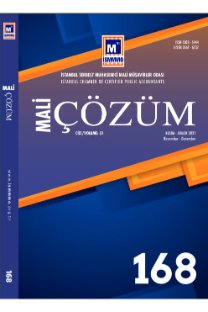NEGATİF DIŞSALLIKLARIN İÇSELLEŞTİRİLMESİNDE PLASTİK POŞET VERGİSİ: TÜRKİYE’DE ÜCRETLİ POŞET UYGULAMASININ DEĞERLENDİRİLMESİ
Vergiler kamu harcamalarının finansmanını sağlamasının yanındadışsallıkların içselleştirilmesinde kullanılan araçlardan biridir. Plastik poşetvergisi de bu amaçla kullanılan bir vergidir. Plastik poşetler hem üretimhem de tüketim aşamasında negatif dışsallık yayarak tüm topluma maliyetyüklemektedir. Bu sebeple, bir çok ülkede uygulanan ve üretim, ithalatveya tüketim aşamasında alınan plastik poşet vergileriyle, plastik poşetlerindışsal maliyetlerini fiyat mekanizmasına dahil ederek talebinin düşürülmesiamaçlanmaktadır. 2019 yılından itibaren Türkiye’de de plastik poşet vergisiözelliklerini taşıyan ücretli poşet uygulaması başlamıştır. Plastik Poşetlerinücretli verilmesi zorunlu hale getirilmiştir. Bu çalışmanın amacı, Türkiye’debaşlayan ücretli poşet uygulamasını değerlendirmektir. Elde edilen ilkverilere göre uygulamadan beklenen sonuçlar elde edilmiş ve plastik poşetkullanımında ciddi azalışlar yaşanmıştır.
PLASTIC BAG TAX FOR INTERNALIZATION OF NEGATIVE EXTERNALITIES: EVALUATION OF PLASTIC BAG FEE IN TURKEY
Taxes are one of the tools used to internalize externalities as well as to finance public expenditures. Plastic bag tax is a tax used for this purpose. Plastic bags emit negative externality both at the production and consumption stages, and they cost the whole society. For this reason, it is aimed to reduce the demand by including the external costs of plastic bags in the price mechanism with the plastic bag taxes applied in many countries and collected during the production, import or consumption stages. Since 2019 Turkey has started the implementation of the plastic bag pricing. This implementation has the plastic bag tax characteristic. It is made compulsory to give plastic bags with charge. The aim of this study is to evaluate the plastic bag pricing in Turkey. According to the first data obtained, the expected results were obtained from the application and there was a serious decrease in the use of plastic bags.
___
- Akullian, A., Karp, C., Austin, K. and Durbin D. (2006). Plastic Bag Externalities and Policy in Rhode Island. Brown Policy Review Paper. Erişim Adresi: http://seattlebagtax.org/referencedpdfs/en-akullianetal.pdf. Erişim Tarihi: 15.09.2019.
- Ayalon, O., Goldrath, T., Rosenthal, G. and Grossman, M. (2009). Reduction Of Plastic Carrier Bag Use: An Analysis of Alternatives İn Israel. Waste Management, 29, 2025–2032.
- Benk, S. (2006). Çevresel Dışsallıkların İçselleştirilmesinde Kullanılan Regülasyon ve Hukuki Sorumluluk Sistemlerinin Değerlendirilmesi. Çimento İşveren Dergisi, 25-33.
- Coase, R. H. (1960). The Problem of Social Cost. Journal of Law and Economics, 3, 1-44.
- Cornes, R. and Sandler, T. (1999). The Theory of Externalities, Public Goods and Club Goods. UK: Cabmridge Unıversity Press.
- Çevre ve Şehircilik Bakanlığı (2019a). Plastik Poşetlerin Ücretlendirilmesine İlişkin Usul ve Esaslarda Değişiklik Yapılmasına Dair Usul ve Esaslar
- Çevre ve Şehircilik Bakanlığı (2019b). Erişim Adresi: https://kirklareli. csb.gov.tr/yeni-yilda-plastik-posete-zam-uygulanmayacak-haber-253857, Erişim Tarihi: 18.02.2020
- Durmuş, M. (2008). Kamu Ekonomisi, Ankara: Gazi Kitapevi.
- European Commission (2013). Impact Assessment for a Proposal for a Directive of The European Parliament and of The Council Amending Directive 94/62/Ec on Packaging And Packaging Waste to Reduce The Consumption of Lightweight Plastic Carrier Bags, Brussels.
- Fullerton, D. and Metcalf, G. E., (1997). Environmental Taxes and The Double-Dividend Hypothesis: Did You Really Expect Something For Nothing? NBER Working Paper Series. No:6199.
- Green Power (2019). Erişim Adresi: https://www.greenpower.org.hk/ html5/eng/byob_info.shtml. Erişim Tarihi: 15.09.2019.
- Güzel, S. ve Özkan, E. (2019). Plastik Poşet Vergisi Uygulaması: Türkiye İçin Bir Değerlendirme. Vergi Dünyası, 28, (455), 43-57.
- Hyman, D.N. (2010). Public Finance: A Contemporary Application of Theory to Policy. Cengage Learning. USA : Mason
- Jalil, A., Mian, N. and Rahman, M.K. (2013). Using Plastic Bags and Its Damaging Impact on Environment and Agriculture: An Alternative Proposal, International Journal of Learning & Development. 3(4), 1-14
- Kane, H. (2018). Israel Sees 80% Drop in Plastic Bag Consumption After 2017 Law Implementing Bag Fee, Erişim Adresi: https://www.haaretz.com/ israel-news/.premium-israel-sees-80-drop-in-plastic-bag-consumption-afterbag- fee-1.6291136. Erişim Tarihi: 01.03.2019.
- Kargı, V. ve Yüksel, C. (2010). Çevresel Dışsallıklarda Kamu Ekonomisi Çözümleri. Maliye Dergisi, 159, 183-202.
- Kılıçer, E. (2018). Plastik Poşet Vergisi ve Örnek Ülke Uygulamaları. Vergi Sorunları Dergisi. 55-64.
- Kirmanoğlu, H. (2011). Kamu Ekonomisi Analiz, İstanbul: Beta.
- Konya Ticaret Odası (2019). Naylonlaşan Dünyada Poşet Krizi, Ekonomik Araştırmalar ve Proje Müdürlüğü Araştırma Raporu. Erişim Adresi: http:// www.kto.org.tr/d/file/naylonlasan-dunyada-poset-krizi-dunya-turkiyeuygulamasi. pdf Erişim Tarihi: 09.09.2019
- Martinho, G., Balaia, N. and Pires, A. (2017). The Portuguese Plastic Carrier Bag Tax: The Effects On Consumers’ Behavior, Waste Management, 61. 3–12.
- Miller, R.M. (2012). Plastic Shopping Bags: An Analysis of Policy Instruments for Plastic Bag Reduction. (MSc Thesis), Universiteit Utrecth.
- Muthu, S.S., Li, Y., Hu, J.Y. and Mok, P.Y. (2009). An Exploratory Comparative Study on Eco-Impact of Paper and Plastic Bags. Journal of Fiber Bioengineering and Informatics, 1, (4), 307-320.
- Öztürk, N. (2007). Ekonomide Devletin Değişen Rolü. Ankara: Palme Yayıncılık,
- Pigou, A. C. (1932). The Economics of Welfare. [y.y.]: Macmillan and Co.
- Rosen, H. and Gayer T. (2007). Public Finance : İnternational . 8.ed. [y.y.] : McGraw-Hill.
- Scitovsky, T. (1954). Two Concepts of External Economies. Journal of Political Economies, 62. 143-151.
- Stavins, R. (1998). Market-Based Environmental Policies, BCSIA Discussion Paper 98-02. ENRP Discussion Paper E-98-02, Kennedy School of Government. Harvard University
- Stiglitz, J. E. (2000). Economics of the Public Sector, London: W.W. Norton & Camapny.
- Temel, H. (2018). Naylon Aşkı Öldürür! Plastik Yaşamdan Kurtuluş Rehberi. İstanbul: Hayy Kitap.
- Tokatlıoğlu, M. ve Selen, U. (2019). Maliye Politikası. Bursa: Ekin Yayınevi.
- Toprak, D. (2006). Sürdürülebilir Kalkınma Çerçevesinde Çevre Politikaları ve Mali Araçlar. Süleyman Demirel Üniversitesi Sosyal Bilimler Enstitüsü Dergisi, 2, (4), 146-169.
- United Nations Environment Program (2018). Legal Limits on Single- Use Plastics and Microplastics: A Global Review of National Laws and Regulations.
- ISSN: 1303-5444
- Yayın Aralığı: Yılda 6 Sayı
- Başlangıç: 1991
- Yayıncı: İstanbul Serbest Muhasebeci Mali Müşavirler Odası
Sayıdaki Diğer Makaleler
UZAYDAKİ GELİŞMELER DOĞRULTUSUNDA YENİ BİR MUHASEBE UZMANLIĞI ÖNERİSİ: UZAY MUHASEBESİ
İsmail TEKBAŞ, Arzu AKTAŞ, Murat AZALTUN, ERSİN KURNAZ
COVID-19 PANDEMİSİNİN TURİZM VE HAVAYOLU SEKTÖRLERİNE MALİ ETKİLERİ ÜZERİNE BİR ARAŞTIRMA
SEÇİLMİŞ OECD ÜLKELERİ BAĞLAMINDA PLASTİK POŞET VERGİSİ ÜZERİNE BİR DEĞERLENDİRME
ŞEREFİYE DEĞER DÜŞÜKLÜĞÜ AÇIKLAMA GEREKLİLİKLERİ ÜZERİNE BİR İNCELEME
MALİ ÇÖZÜM DERGİSİNDE YAYINLANMIŞ MUHASEBE VE DENETİM MAKALELERİNİN İÇERİK ANALİZİ: 2010-2020
